Kenya's Ololo Farm Targets Net-Zero Emissions by 2030 through Regenerative Agriculture Practices
Elevating SDG2 – Zero Hunger, SDG 3 – Good Health and Wellbeing, SDG 12 – Responsible Consumption and Production, SDG 13 – Climate Action, SDG 15 – Life on Land, and SDG 17 – Partnerships for the Goals
In Kenya, as in many countries around the world, climate change is a threat to sustainable food production, especially with the current rate at which the topsoil is being washed away. Soil also plays a critical role in climate change, with research showing that there is more carbon stored in soil than in all the world’s trees. Unfortunately, much of this carbon is being released into the atmosphere by deforestation and poor farming.
Ololo Farm and Safari Lodge believes that farmers have the best chance of addressing this challenge and is taking up the fight to reverse the effects of climate change by embedding sustainability into their business processes through regenerative agriculture practices.
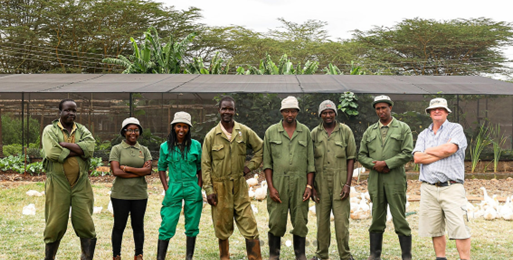
Ololo Farm and Safari Lodge team members on the farm.
Ololo Farm joined the United Nations Global Compact Network Kenya and participated in the Climate Ambition Accelerator, the Young SGD Innovators Program, and the SDG Ambition Accelerator to better understand the business case for sustainability.
George Chapman, Founder and Manager of Ololo Farm and Safari Lodge, noted, “The Accelerators provided opportunities for our team to be inspired, build capacity, and connect with like-minded changemakers from different organizations. The UN Global Compact Academy also served as an important library and hub of knowledge on the Sustainable Development Goals (SDGs), helping us to understand how to integrate the SDGs into our business strategy, and how to measure and report impact”.
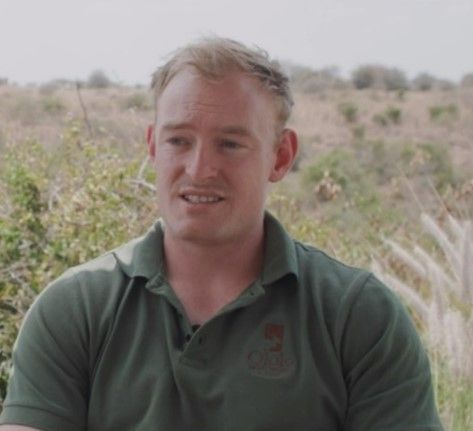
George Chapman, Founder and Manager of Ololo Farm and Safari Lodge.
Subsequently, Ololo Farm began conducting its business even more responsibly than before by embedding sustainability at the heart of its operation using regenerative farming practices and setting science-based targets, with the aim of achieving Net Zero Emissions by 2030.
Located on the southern border of the Nairobi National Park, Ololo Farm was established in 2017. They farm pasture-reared poultry and eggs, grow mushrooms, and run an organic Shamba, which is the Swahili word for farm in East Africa. Along with this, the farm also operates a busy safari lodge where guests can explore nature and enjoy delicious meals straight from paddock to plate.
The company is now investing in innovative projects that champion the SDGs, especially SDG2 – Zero Hunger, SDG 3 – Good Health and Wellbeing, SDG 12 – Responsible Consumption and Production, SDG 13 – Climate Action, and SDG 15 – Life on Land. By leveraging regenerative agriculture practices the farm is harnessing several benefits including reversing climate change by rebuilding soil organic matter and restoring degraded soil biodiversity, resulting in both carbon drawdown, improving the water cycle, and ensuring carbon sequestration.
“With regenerative farming we focus on more sustainable farming methods. By mimicking nature, we can actively use livestock to rebuild the soil, while allowing the livestock to be pasture fed. We are working in sync with nature to ensure a healthier, more sustainable food system” George Chapman said.
Some of these regenerative practices include:
Promoting a circular food system
In 2021, the farm introduced insects (Black Soldier Flies - BSF) as a nature-based solution to help advance its action on climate change and food security by enhancing their circular food economy model. The BSF is a wasp-like fly, native to the US but now found naturally across the tropics. In the past decade, the fly has become famous to farmers since the larvae of these flies can quickly turn ‘organic waste’ into high-value agricultural inputs i.e., organic fertilizer. The larvae also serve as quality protein when fed to livestock including chicken and ducks.
The impact of the insect project has scaled to the community as the farm now doubles as a training centre, where 50 farmers have already participated in organized workshops. More than 10 of the trained farmers now own and manage their insect farms, harvesting larvae and frass for garden use. The quality of produce has also improved significantly using its flytilizer/frass i.e., the organic fertilizer coming from the BSF farm.
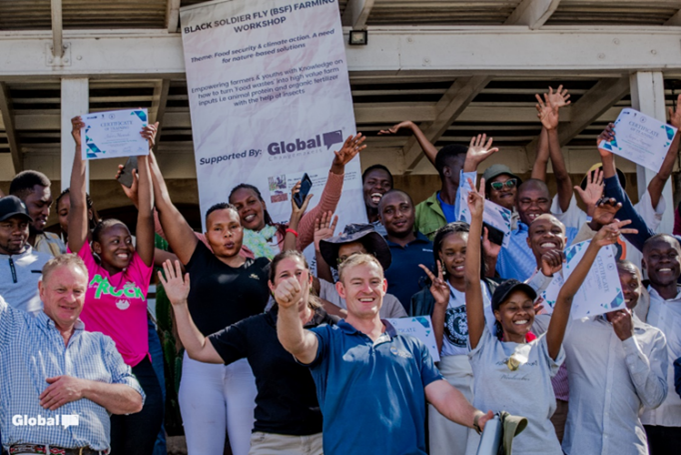
George Chapman with participants of the BSF training.
Pasture-based production system
This system allows animals to experience a more natural environment and enjoy a diverse and nutritious diet from fresh pastures every day. At the same time, the system adds organic matter to the soil from the manure the animals produce. It also loosens the soil from the hoof action of the animals and feet scratching of the poultry. This not only restores degraded soil biodiversity - resulting in both carbon drawdown and improving the water cycle - but also boosts the nutrient density in the farm’s poultry and dairy products.
Organic Fertilizer Farming
The farm avoids the use of agrochemicals i.e. synthetic fertilizers, instead preferring the use of organic fertilizers from their animals. Agrochemicals used in conventional farming cause a lot of damage to the health of the soil, animals, and subsequently the health of humans too. By using only organic fertilizers, the farm guarantees healthier, more nutrient dense products.
Food Waste Management and Reuse
Today, 100% of ‘food waste’ from Ololo farm and kitchen are upcycled into high-value organic manure and animal protein. The farm upcycles about 2 tons of ‘food waste’ monthly; producing about 200 kgs of animal protein and organic manure monthly. This means they divert about 25 tons of ‘food waste’ annually that would otherwise go into a landfill, hence saving the equivalent of 47.5 tons of CO2. By this system, the farm has also reduced its dependency on conventional feed by 20% and subsequently their production cost by 5% as at June 2023.
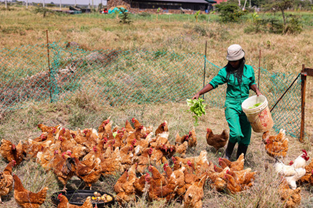
A farmer at Ololo Farms feeding chickens with ‘food waste’ from the Lodge’s kitchen.
Community Sustainability Drive
Ololo Farm is not just producing responsibly, they are also engaging their guests at the lodge, the local market, their value chain suppliers, and the community to encourage sustainable consumption, production, and waste management.
The company launched the Ololo Foundation early in 2023 with the ambition to green and clean the community in a creative and fun way.
So far, they have engaged hundreds of children from the neighbouring Oloosirkon school in Tuala to adopt trees at their school, waste recycling including plastic and organic waste, rugby training, farm tours, and conservation trips to the famous Nairobi National Park.
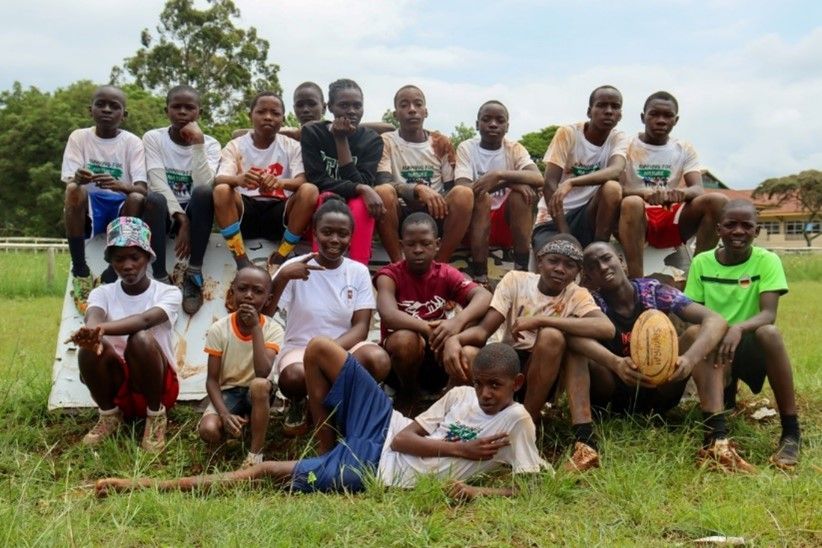
Children from the neighbouring Oloosirkon school in Tuala take Rugby training and are part of Ololo Foundation’s School Tree Planting and Waste Recycling program.
The path has not been all smooth and Ololo Farm has faced its share of challenges in trying to foster change. Some of these include cost considerations, supply chain complexities, and the lack of supportive regulatory frameworks and incentives for sustainability initiatives.
Despite these challenges, the farm remains committed to producing healthy and nutritious food in a sustainable environment by ensuring the highest standards of quality of care for the land, the people, the animals, and the environment.
Judy Njino, Executive Director for the UN Global Compact Network Kenya, commends Ololo Farm and Safari Lodge for their efforts in advancing the Sustainable Development Goals.
“Ololo Farm has shown that where there is a will there is a way. Their commitment to sustainable agriculture is yielding much fruit. The best part is that the positive impact has extended beyond the farm to other players in the ecosystem.
The UN Global Compact Network is here to support their sustainability ambition and that of other participating organizations through our various accelerators, trainings, and resources so that we can collectively achieve the SDGs faster,” she says.

Judy Njino, Executive Director, UN Global Compact Network Kenya.
Learn more about the programs of the UN Global Compact Network in Kenya.
